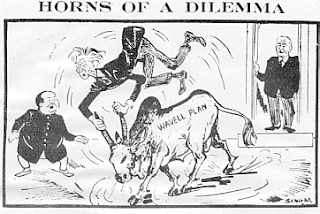At a time when tension was mounting, it was imperative that the country should have a strong and stable government at the centre. The Cabinet Mission had failed in the formation of a national interim government. In July 1946, the Viceroy, Lord Wavell, once again took the initiative and called upon Jawaharlal Nehru to form the Government. Jinnah, who was approached by Nehru, refused to cooperate, was bitterly critical and announced that August 16 would be observed by the Muslim League as "the Direct Action Day". On that day Calcutta witnessed a communal riot, the scale and intensity of which had never been known in living memory. "The Great Calcutta Killing" touched off a chain reaction of violent communal explosions in East Bengal, Bihar and the Punjab,
As the news of disturbances in Bengal came through, Gandhi cancelled all his plans and decided to leave for the riot-affected areas. In East Bengal he noticed how fear, hatred and violence had come to pervade the countryside. He toured the villages, was things at first hand, and tried to lift the issue of peace from the plane of politics to that of humanity. Whatever the political map of the future, he pleaded, it should be common ground among all parties that standards of civilized life would not be thrown overboard.
Gandhi’s presence acted as a soothing balm on the villages of East Bengal; he eased tensions, assuaged anger and softened. In March 1947, he left for Bihar where the Hindu peasants had wreaked a terrible vengeance on the Muslim minority for the misdeeds of the Muslim majority in East Bengal. In Bihar, Gandhi’s refrain was the same as in East Bengal: the majority community must repent and make amends; the minority must forgive and make a fresh start. He would not accept any apology for what had happened, and chided those who sought in the misdeeds. Of the rioters in East Bengal, a justification for what had happened in Bihar. Civilized conduct, he argued, was the duty of every individual and every community irrespective of what others did
Alarmed by the increasing lawlessness, Lord Wavell brought the Muslim League into the Interim Government. The formation of the coalition between the Congress and the League fanned political controversy instead of putting it out. The Constituent Assembly had been summoned to meet on December 9, 1946, but the Muslim League refused to participate in its deliberations. The constitutional impasse looked complete when in the last week on November in an eleventh hour bid to bring the parties together, the British Government invited Wavell, Nehru, Jinnah, Liaquat Ali and Baldev Singh to London. The discussion proved
Abortive, but the British Government issued a statement to clarify the points at dispute. Though this clarification largely met its objections, the Muslim League did not lift its boycott of the Constituent Assembly.
The year 1947 dawned with the darkest possible prospects on the political horizon. To check the drift to chaos, Clement Attlee, the British Premier, came to the conclusion that what was needed was a new policy and a new Viceroy to carry it out. He announced in the House of Commons on February 20, 1947 that the British Government definitely intended to quit India by June 1948, and if by that date the Indian parties did not agree on an all-India constitution, power would be transferred to "some form of Central Government in British India or in some areas to the existing Provincial Governments." Simultaneously it was announced that Lord Mountbatten would succeed Lord Wavell as Viceroy.
The new Viceroy, with Lord Wavell
The British withdrawal had been decided and dated by the February20th statement. Lord Mountbatten arrived in India in March and one of his first acts as Viceroy was to invite Gandhi for a discussion. The Mahatma interrupted his peace mission in Bihar and travelled to New Delhi. During the next few weeks it became evident that a solution of the political deadlock would be sought through the division of India. The Muslim League led by Jinnah was adamant, but there was also a re-orientation of the Congress attitude towards partition. Hitherto the Congress had insisted that partition should, if at all, follow and not precede political liberation, that there could be "no divorce before marriage". But the few months of stormy courtship in the Interim Government had cured Nehru, Patel and other Congress leaders of the desire for a closer union with the Muslim League. In the spring of 1947, the choice seemed to them to be between anarchy and partition; they resigned themselves to the latter in order to salvage three-fourths of India from the chaos which threatened the whole.
Saturday, June 28, 2008
Subscribe to:
Post Comments (Atom)




No comments:
Post a Comment